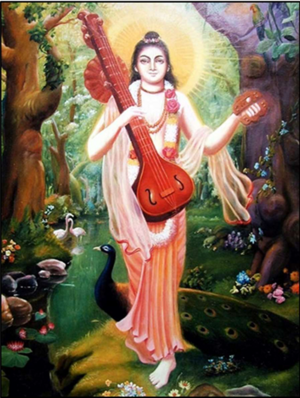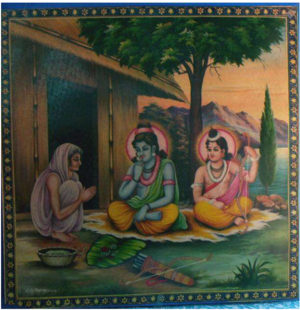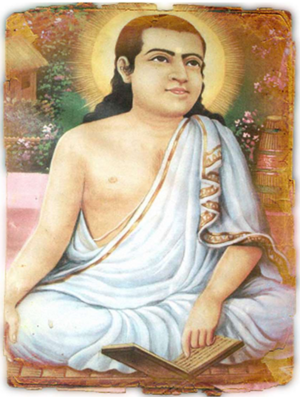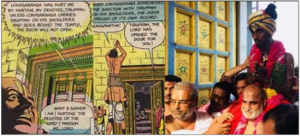Talk:Community or Ethnicity
By Vishal Agarwal
Hūṇāḥ, Kirātāḥ, Pulindāḥ, Āndhrāḥ, Ābhīrāḥ, Kaṅkāḥ, Yavanāḥ, Khaśāḥ – regardless of their origin or background, become one with Him by merely seeking refuge as His devotees – to that Lord Viṣṇu, I offer my respects. Bhāgavata Purāṇa 2.4.18
Devarṣi Nārada was born to a dancer. The mother of Ṛṣi Vedavyāsa was a fisherwoman. Ṛṣi Vasiṣṭha’s mother was also a professional dancer. They became the foremost Ṛṣis of Sanātana Dharma.
It is a myth that Hindu Dharma is ‘Brahmanical’. Such an assertion is an insult to the intelligence of the 96% of Hindus who do not have Brāhmaṇa parentage. The fact is that members of all communities and ethnicities have laid the foundation of our Dharma, have contributed to it, and have formed the bulk of our society throughout history.
Śabarī, the Tribal Woman
Lord Rāma and his brother Lakṣmaṇa were traveling through the forests of peninsular India in search of Devī Sītā, the wife of Lord Rāma, who had been kidnapped. They happened to pass by the Āśrama (hermitage) of Sage Mataṅga. In that hermitage lived a humble, unintelligent, and illiterate tribal woman named Śabarī. Everyone thought that she was foolish, and they made fun of her because she was ugly and simple-minded. But Śabarī always did her work diligently in the Āśrama, served her Guru, and remembered the Lord in her heart. On his death bed, the Sage told Śabarī that her devotion would be rewarded and Lord Rāma would come Himself to her.
Many years later, when she heard that the Lord was coming in the direction of the Āśrama, her joy knew no bounds! She wanted to feed the most delicious fruit and berries to Lord Rāma to satiate his hunger. So she went around from one bush of berries to another, plucking berries in a plate. She chewed one-half of each berry. Whenever she tasted a delicious and sweet berry, she would store the unchewed half in a bowl. When she came across a bitter one, she would throw the whole berry away.
When the Lord arrived, she offered Him a seat and water, and then gave Him the bowl of half-chewed sweet berries. In her excitement, she had forgotten that we must never give dirty food to our guests. Lakṣmaṇa felt disgusted that Śabarī had offered her half-chewed berries to Lord Rāma. But the Lord was so touched by the simple devotion and love of the tribal woman, that He ate the berries offered by her with great delight. After He had finished the berries, Śabarī folded her hands in Namaste, and asked the Lord with great devotion – “O Lord! I do not know the correct procedure for worshipping You, because I am an illiterate woman born in a tribe. On top of that, I am not very intelligent or wise. Please forgive me if I have offended You in any way.”
Lord Rāma replied –
“O beautiful lady! Listen to me. One should not take pride in one’s wealth, strength, good qualities, intelligence, or due to belonging to a good family or varṇa. Instead of seeking praise from others, we should simply take refuge in Bhakti and should praise Him alone. Because a person who lacks devotion and faith is like that useless cloud that soars high up in the sky but does not shower any life-giving rain. Now I shall explain to you the nine paths of Bhakti. Pay attention and listen to what I say.
- First, seek always the company of saintly and virtuous people.
- Second, instead of paying attention to useless talk, spend time listening to the biographies of the Lords and Saints.
- Third, serve your Guru with humility.
- Fourth, give up all crookedness of heart and sing the praises of the great qualities of God.
- Fifth, chant the holy Vedas and recite the sacred mantras, sing bhajans, and pray whenever you can.
- Sixth, follow what the good people do, keep your senses under control, and do a lot of good deeds.
- Seventh, treat everyone as equal and see Me in everyone.
- Eighth, do not be greedy and be satisfied with what you get as a result of your labor. Also, do not see faults in others even in your dream, but always see their good side and encourage them.
- Ninth, be straightforward, do not show any cunningness, and have faith in Me alone with all your heart.
Rare is that man or woman in whom you can see even one of these nine types of devotion. Dear Śabarī, everyone makes fun of you. But I can see that in reality, you are the most beautiful woman because all these nine forms of devotion are practiced by you with great humility. Today, I will give you that reward that even Yogis and Saints do not get easily. I shall reveal My Divine form to you.”
And then Lord Rāma showed His form as Lord Viṣṇu to her. Śabarī’s soul then left her body and merged with Lord Rāma. She attained Mokṣa as a result of her humility and simple devotion to the Lord.
Baijyanātha, the Lord of Baiju the Woodcutter:
A liṅga was located in a dilapidated temple, deep in the jungles of Bengal. The local priests neglected this remote shrine.
Only Baiju, the woodcutter, would reverently thump the liṅga with his axe every day. In one of their rare visits, the priests saw the woodcutter strike the liṅga. They were horrified. “May the Lord destroy you with His third eye,” they yelled.
Suddenly, from the liṅga came a voice: “I cannot destroy Baiju; I love him. He remembers me enough to hit me every single day. His actions are more earnest than your occasional distracted prayers.” Baiju was blessed by Śiva and he attained mokṣa. Since then this liṅga, located at Puruliya in Bengal, has come to be known as Baijyanātha; some consider it to be a jyotirliṅga.[1]
This narrative clearly shows that insincere prayers, even if done following the learned procedures by learned priests, are worthless compared to the sincere and simple devotion of an unlettered woodcutter. The shrine is enumerated among the esteemed twelve Jyotirliṅga-s of Śaiva Hindus.
The Friends of Tulasīdāsa
In his Rāmagyā Praśnāvalī, Tulasīdāsa has listed the names of his friends and individuals who participated in his religious discourses. Other than a few, all the friends and participants appear to be from various varṇa-s.
Numerous examples from his life show his regard for people from all social classes. Once, Sant Nābhādāsa[2] invited him for a meal at his home. Tulasīdāsa got busy and forgot to show up on time. That night, when he remembered the invitation, he regretted his memory lapse. He immediately rushed to the home of the Sant and requested for leftovers so that he could fulfill his promise.
One day, Tulasīdāsa was seated inside a temple and he heard a lot of commotion outside. Upon inquiry, he discovered that some Bhīla tribals wanted to enter the Maṇḍira to meet him, but they were not allowed to do so. Some priests objected that Bhīlas being tribals would pollute the Maṇḍira by entering it. As soon as Tulasīdāsa heard of this, he rushed outside and greeted the Bhīlas with reverence. He said, “I bow to the Bhīlas because my Rāma had spent time in their company during His fourteen-year exile in the forest.” Even in his magnum opus, the Rāmacaritamānasa, Tulasīdāsa has given a beautiful and reverential description of tribal devotees and friends of Rāma such as the Niṣāda-rāja, Kevata, and Śabarī.
Rādhikā, the Fisherwoman
The Tembuvānī River in Assam is a tributary of the mighty Brahmaputra. In the rainy season, the Brahmaputra caused a great backflow of water into the Tembuvānī. As a result, the people living on the banks of the river had to suffer a lot. The swollen river washed away their homes, crops, and soil in the fields. The villagers approached Śaṅkaradeva and sought his help. The saint decreed that if a chaste woman were to pour some water into the stream with a vessel that had holes all over it, the river would subside permanently. The wives of Brāhmaṇas, Kāyasthas, and all other men were approached with a request to do so, but they declined. “How could water stay in a vessel with holes in it,” they said.
The villagers went in a large group to Śaṅkaradeva to convey the bad news that no lady was willing to take up the challenge. At the same time, a fisherman named Pūrṇānanda and his wife Rādhikā were going down the Tembuvānī River on a boat. Seeing the crowd, they too approached the saint. When Rādhikā heard the cause of the meeting, she promptly offered to help. Everyone including her husband was aghast at her audacity. How could a fisherwoman do what the priestly ladies could not? But Śaṅkaradeva intervened and asked the fisherwoman to observe a fast in honor of God and come to the site the following day, carrying water in the perforated vessel.
The next day, the lady did as she was told. Everyone was stunned to see that the humble but pious fisherwoman, with the blessings of the saint and Bhagavān, was able to carry water in the perforated container without losing it. As soon as she poured it into the Tembuvānī River, the waters of the river immediately came to a standstill. This miracle allowed the villagers to construct a dam to divert its flow and prevent flooding in the future.[3]
Munivāhana Tiruppāṇ Āḻvār
In the region of Tamil Nadu and Kerala lived twelve divinely inspired Vaiṣṇava saints named Āḻvār-s (those immersed in the love of Viṣṇu) whose 4000 hymns of devotion are compiled in the Divya Prabandham. Included in this collection is a ten-verse hymn called Amalanātipirān composed by Tiruppāṇ Āḻvār.
Tiruppāṇ was a member of the Pāṇar community and was once standing in the path of a sage named Loka Sāraṅga, who was proceeding to the River Kaverī for his ritual bath. Absorbed in meditation on Viṣṇu, Tiruppāṇ did not hear the sage’s request to move. The sage, irritated, threw a pebble that struck Tiruppāṇ on the head and caused him to bleed. Without anger, Tiruppāṇ quietly moved aside.
Later that day, when Loka Sāraṅga entered the temple at Śrīraṅgam, he was shocked to see blood on the forehead of the mūrti of Viṣṇu. That night, Viṣṇu appeared in his dream and said, “You have hurt My devotee Tiruppāṇ. Now bring him to Me on your shoulders.”
Ashamed, the sage approached Tiruppāṇ and conveyed the Lord’s command. Tiruppāṇ at first refused, feeling unworthy to enter the temple, but when the sage insisted and explained the dream, Tiruppāṇ agreed. He ascended the sage’s shoulders and entered the sanctum.
There, upon beholding the deity, Tiruppāṇ was overwhelmed and composed the Amalanātipirān — ten verses that describe the Lord’s beauty from His sacred feet upward to His crown. As he finished the hymn, a light emerged from Tiruppāṇ and merged into the deity, signifying his liberation (mokṣa).
To this day, the event is commemorated in South Indian temples, where a priest carries an image of Tiruppāṇ Āḻvār on his shoulders — recalling the moment when a Muni became the vehicle for a devotee blessed by Viṣṇu.
References[edit]
- ↑ Pattanaik, Devdutt. Śiva: An Introduction. Vakil, Feffer and Simons Pvt. Ltd., 1997, p. 88, Mumbai.
- ↑ Author of the famous scripture Vaiṣṇava Bhaktamāla which describes the lives of inspiring Bhaktas of Viṣṇu and His Avatāras.
- ↑ Borkakoti, Sanjib. Śrī Śrī Śaṅkaradeva, a Total Personality. Bani Mandir, 1995, pp. 19–20, Guwahati.





